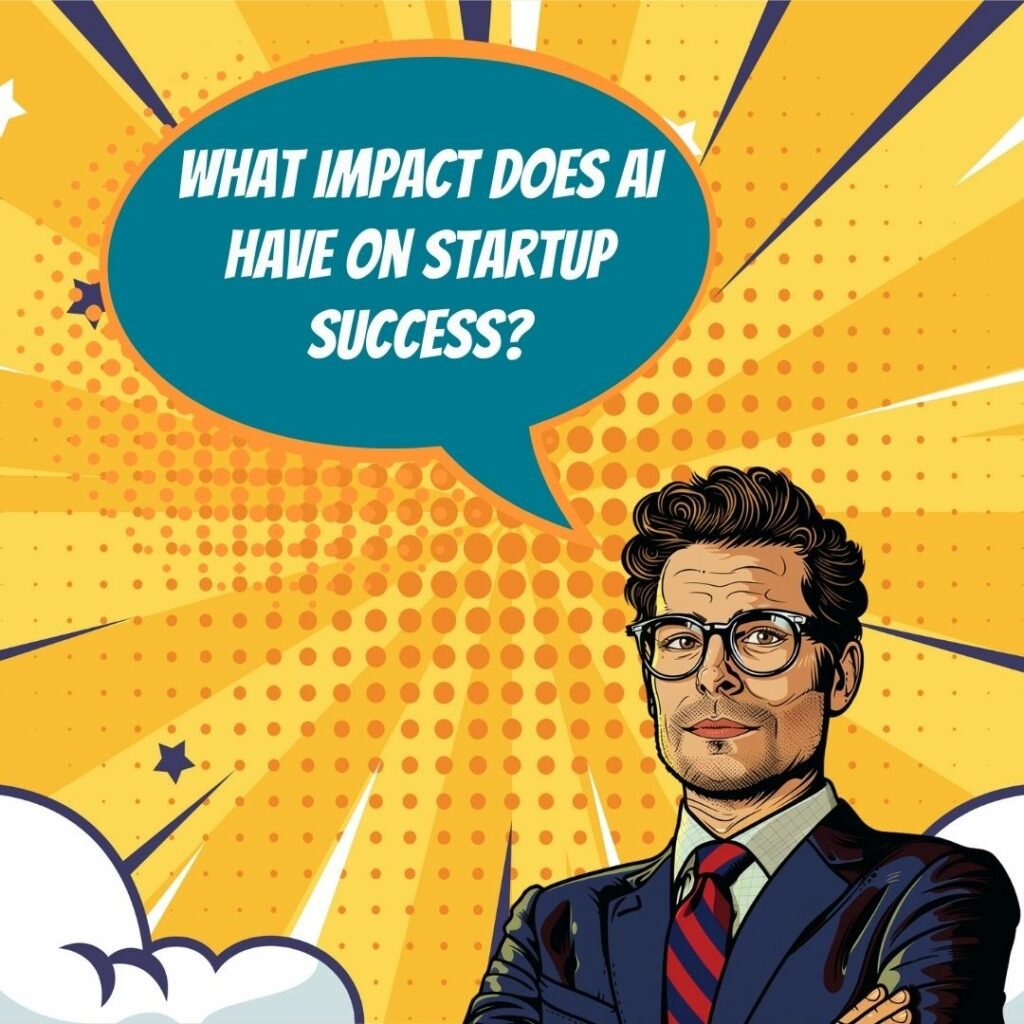Key Takeaways
✅ Automation and Efficiency: Leveraging AI can simplify tasks such as data entry, customer service, and supply chain management. This reduction in manual workload allows startups to focus on strategic initiatives, decreasing the risk of human error and increasing overall efficiency.
✅ Enhanced Decision-Making and Data Analysis: AI's capability to analyze large datasets provides startups with real-time insights and predictive analytics. By improving decision-making processes, AI helps in product development, marketing strategies, and financial planning, thus reducing risks and enhancing accuracy.
✅ Innovation and Personalization: AI aids startups in developing new products and services tailored to customer needs. It enhances customer interactions through AI-driven chatbots and virtual assistants, increasing user satisfaction and fostering growth.

Introduction
Have you ever wondered how startups manage to scale so rapidly in today's competitive market? The secret often lies in the strategic use of Artificial Intelligence (AI). AI is not just a buzzword; it is a crucial tool transforming the startup ecosystem by automating mundane tasks, enhancing decision-making processes, and driving innovation. From AI chatbots providing customer service to algorithms analyzing vast data sets for market trends, startups are utilizing AI to gain a competitive edge.
Despite the common fear that AI might replace human jobs, the reality is that it often complements human efforts, making startups more efficient and innovative. In an era where data is the new oil, AI can help startups navigate the complexities of the market and maximize their return on investment (ROI). This article will delve into how AI is steering startups towards unprecedented growth, offering actionable insights and groundbreaking strategies that can be implemented immediately.
Top Statistics
| Statistic | Insight |
|---|---|
| Global AI Market Size in 2024: Expected to reach $184 billion. | This tremendous growth underscores AI's pivotal role in the evolution of startups, making it imperative for emerging businesses to integrate AI solutions. |
| Generative AI Market Growth in 2023: Increased by 93.77%. | A staggering increase highlighting the explosive potential and opportunities within the generative AI sector for innovation and creative solutions. |
| AI Adoption by Businesses: 35% of global companies use AI, and 42% are exploring its possibilities. | Reflects a growing recognition of AI's strategic value, suggesting that startups must consider adopting AI to remain competitive. |
| AI Job Creation: Expected to create around 97 million new jobs by 2030. | While AI fears job losses, it's reassuring to note the simultaneous potential for substantial job creation, making it a balanced advancement in the tech landscape. |
| AI in Retail and Consumer Space: Over 80% of executives expect to use AI automation by 2025. | This expectation signals significant shifts in retail, emphasizing the urgency for startups in this space to adopt AI for operational efficiency and customer experience. |
The Transformative Role of AI in Propelling Startup Growth
Artificial Intelligence (AI) has become an indispensable force in today’s business environment. By enabling companies to develop innovative products and services, AI helps optimize operations and address real-world challenges in a cost-effective and scalable manner. Startups, in particular, benefit by leveraging AI to find competitive advantages in their markets. The shift is not just technological but cultural, as startups build entirely new ways of doing business with AI at their core.
Predictive Analytics and Data-Driven Decision Making
AI-driven data analysis helps startups optimize operations and improve customer experiences by identifying patterns in user behavior. Imagine a small e-commerce startup using AI to analyze purchase trends, customer reviews, and online interactions. The insights garnered can lead to personalized marketing campaigns, optimized supply chain logistics, and reduced operational costs. According to a report by McKinsey, companies that use consumer behavior insights outperform peers by 85% in sales growth.
Operational Efficiency and Automation
AI has the potential to significantly contribute to a startup’s growth by optimizing processes, reducing overhead, and enabling team members to focus on critical tasks. Automating routine tasks like data entry, reporting, customer support, content creation, email campaigns, and social media scheduling allows startups to allocate more time and resources to strategic activities like product development, marketing, and customer relationship building. An AI-driven approach can also lead to faster decision-making and higher productivity, making operational goals more attainable.
AI-Powered Marketing and Sales
AI-powered marketing leverages chatbots to interact with customers, prospects, and leads. These "assistants" can understand natural language inputs and generate human-like responses, enabling more effective engagement and personalized communication. For instance, a startup can use AI to segment its customer base and deliver targeted advertisements that resonate more with each segment. This kind of precision marketing not only enhances customer engagement but also converts leads into loyal customers.
Ethical Considerations and the Future of AI in Startups
While AI offers numerous benefits for startups, ethical considerations must be addressed carefully and responsibly. Questions about the values, principles, and responsibilities that guide AI development and use arise, such as ensuring respect for human rights and dignity and avoiding discrimination and bias. Startups must be vigilant in implementing ethical guidelines and maintaining transparency in AI applications. The future of AI in startups hinges on balancing innovation with these ethical imperatives.
Embracing Sustainability and Open Source
AI startups should prioritize sustainability by adopting open source strategies, which can speed up development, reduce costs, and provide more transparency and trust. This approach helps startups own their data and avoid vendor lock-in, ensuring long-term sustainability and competitiveness. By using open-source AI tools, startups can foster a collaborative environment, drive innovation, and remove barriers to entry for future AI advancements. This sustainable approach is becoming increasingly critical as startups look to build resilient and ethical business models.
AI Marketing Engineers Recommendation
Recommendation 1: Leverage AI-Powered Customer Insights: Understand your customers on a deeper level by employing AI algorithms to analyze their behaviors, preferences, and feedback. According to a 2022 McKinsey report, companies utilizing AI in customer insights saw a 10-15% boost in sales. This approach helps startups create personalized marketing strategies that increase customer engagement and retention.
Recommendation 2: Automate Routine Tasks with AI: Use AI to handle repetitive and time-consuming tasks such as data entry, customer service, and email marketing. Current trends indicate that AI can reduce operational costs by up to 30%, according to Gartner. By automating these tasks, startups can free up resources for more critical activities, allowing them to scale efficiently without significantly increasing overhead costs.
Recommendation 3: Implement Predictive Analytics for Growth Forecasting: Predictive analytics, powered by AI, can help startups forecast market trends and customer demand with remarkable accuracy. Statista reports that 56% of businesses are using AI for data analysis to fine-tune their growth strategies. Tools like IBM Watson or Google Cloud AI provide actionable insights, helping startups make informed decisions about product launches, inventory management, and market expansion.
Relevant Links
- How AI is Revolutionizing Digital Marketing
- Key Factors for Successful Campaign Goals
- Enhancing Market Penetration through Targeted Strategies
- Analyzing User Behavior for Better Decision Making
- Personalized Ads for Higher Engagement
Conclusion
Artificial Intelligence is proving to be a game-changer for startup growth, driving innovation and efficiency in unprecedented ways. The ability to leverage predictive analytics for data-driven decision-making empowers startups to fine-tune their operations and tailor customer experiences. Automation, one of AI's most transformative features, enables startups to save both time and resources by streamlining routine tasks, allowing them to focus on strategy and development.
Furthermore, the impact of AI-powered marketing and sales cannot be overstated. With AI chatbots offering personalized and efficient customer interactions, startups can maintain a competitive edge in the market. However, it is crucial to navigate the ethical considerations surrounding AI responsibly, ensuring that its use aligns with fundamental human rights and avoids bias.
Embracing sustainability through open source strategies is another key step for startups. This not only accelerates development but also ensures transparency and long-term viability. As we look to the future, startups that fully integrate AI into their business models while maintaining ethical and sustainable practices are likely to lead the way. The potential is vast, and the opportunities for growth are immense. How will your startup harness the power of AI?
FAQs
Question 1: What is AI for business?
Answer: AI for business refers to the application of artificial intelligence technologies to improve business operations, enhance decision-making, and drive innovation. It involves using machine learning, deep learning, and other AI techniques to automate tasks, analyze data, and create new products or services.
Question 2: Why is AI for business important?
Answer: AI is crucial for businesses as it can significantly improve efficiency, reduce costs, and enhance customer experiences. It also enables companies to make data-driven decisions, stay competitive, and innovate in their respective markets.
Question 3: Who can take an AI for business course?
Answer: Anyone interested in learning about AI and its applications in business can take an AI for business course. This includes entrepreneurs, business professionals, and individuals looking to upskill or reskill in the AI domain.
Question 4: What data are you training on?
Answer: The data used to train AI models is critical to their performance. AI startups should ensure they have high-quality, relevant, and diverse data sets to train their models effectively.
Question 5: How are you collecting, cleaning, and labeling your data?
Answer: Data collection, cleaning, and labeling are essential steps in preparing data for AI model training. Startups should have a clear process for these tasks to ensure accurate and reliable results.
Question 6: What predictions or process does your AI help with?
Answer: AI startups should clearly understand how their AI solutions create value by making predictions or improving processes. This helps in identifying the core drivers of their business and where AI can be most helpful.
Question 7: How does your AI impact important customer metrics?
Answer: AI startups should measure the impact of their AI solutions on key customer metrics such as retention and churn. This helps in understanding the effectiveness of their AI implementations.
Question 8: How can I attract investors to my AI startup?
Answer: To attract investors, AI startups should craft a compelling pitch deck that showcases their market potential and competitive advantage. They should also identify potential investors interested in AI technologies and be prepared to address common investor questions.
Question 9: What are the key challenges I should anticipate in the AI startup industry?
Answer: AI startups should anticipate challenges such as intellectual property protection, ethical considerations, and staying up to date with evolving trends and opportunities in the AI industry. They should also be prepared to navigate technical and business obstacles.
Academic References
1. The Role of Data for AI Startup Growth. This study finds that AI startups using proprietary training data are more likely to receive venture capital funding, highlighting the importance of data in AI product development.
2. Aiello, F., & Leone, B. (2020). AI as a Boost for Startup Companies: Evidence from Italy. This paper examines the potential benefits of integrating artificial intelligence within startups, focusing on the scalability and growth of startups through novel technologies.
3. Brown, J. (2021). Artificial Intelligence and Automation for the Future of Startups. This chapter explores the potential benefits of integrating AI and automation within startups, highlighting the future prospects and opportunities for startup growth.












